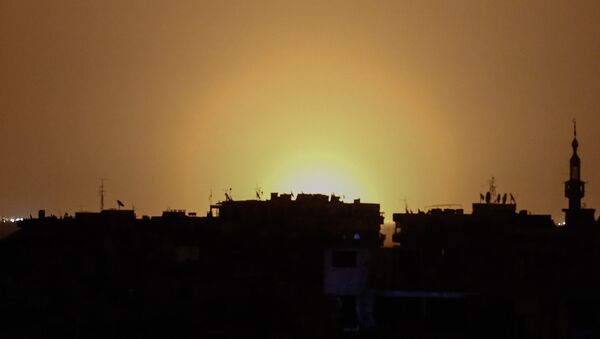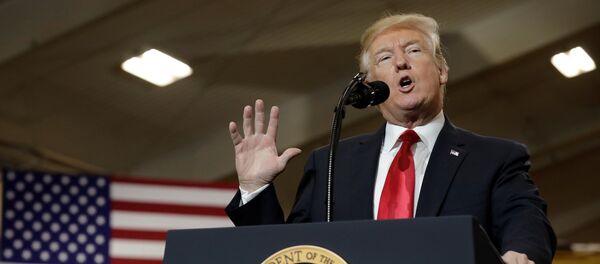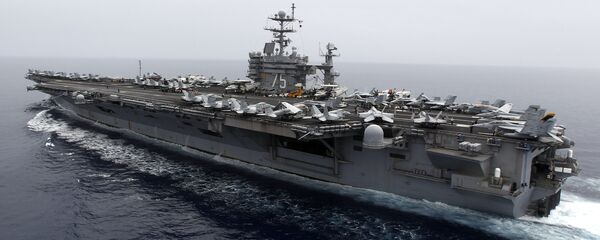The United States and its allies are blaming the Syrian government and its supporters, Russia and Iran, for the case. Damascus has already invited the Organization for the Prohibition of Chemical Weapons (OPCW) to visit Duma to carry out a probe into the reported attack, however, the Western countries are mulling a swift response.
On Wednesday, US President Donald Trump urged Russia to "get ready" after Moscow warned that it would shoot down any missiles targeting Syria. The White House later clarified that the final plans still had not been made.
READ MORE: Threat of Western Strike on Syria: What is Known So Far
Meanwhile, UK Prime Minister Theresa May on Thursday summoned ministers for an emergency meeting to discuss the response amid the calls of opposition leader Jeremy Corbyn for a parliamentary vote on a strike against the Syrian government.
No War
The tensions between the two superpowers, Russia and the United States, are not likely to "degenerate into an exponentially dangerous situation, implying American and Russian military in direct confrontation on the ground, at sea or in the air in Syria, Didier Leroy, assistant professor at the Brussels university (ULB) and researcher at Belgium's Royal Institute of Defence, told Sputnik.
"The United States have a relatively low knowledge of the region and President Trump does not master the geopolitical basics of the region," the expert explained.
The response to the alleged attacks is likely to be "limited," according to Assistant Professor for Defense Studies at King’s College, London and expert on the region Andreas Krieg.
"I think Western allies are aware of their leverage in Syria at the moment, which is limited. The key players are Russia, Iran and somewhat Turkey. They can exercise leverage on the ground in a way that even the US cannot," Krieg told Sputnik.
A response will be "primitive," rather than a game-changer, according to the expert.
READ MORE: US Strikes on Syria Would Be a Violation of UN Charter – Analyst
At the same time, retaliation for what the United States and its allies believe was an attack on civilians will follow, Leroy warned.
Measured Response
"Trump wants to show strength as does [French President Emmanuel] Macron who want to demonstrate that a red line has been crossed — but for this exercise no one in the West is willing to get their hand burned. There is no political will for an extensive military operation," the King’s College professor argued.
The problem, according to Krieg, is that "the West has absolutely no strategy for Syria, most importantly no vision for an end state to be achieved."
Potential Targets
It is unclear if last year's similar standoff over the attacks in Syria's Khan Sheikhoun will serve as a blueprint for this year's crisis. In April 2017, the United States launched 59 Tomahawk cruise missiles at Syria's Shayrat air base in the Homs province in response to reports of chemical weapons' used against civilians. Damascus rejected all accusations then, pointing out that its chemical weapons stock had been destroyed, as certified by the OPCW.
READ MORE: Trump Falls Back via Twitter: "Never Said When Attack on Syria Would Take Place"
"The airstrike will have to be heavier than the cruise missile attack on the Shayrat base earlier. It should be symbolic; an Iranian military infrastructure of the Hezbollah in Syria or the presidential palace of Assad in Damascus for example," Leroy said.
Krieg believes, however, that the presidential palace will not be targeted, as it would provoke a strong reaction from Russia. The strikes may aim at "military installations, bases and command and control centers," instead.
The Kremlin said earlier in the day, amid mounting tensions, that the hotline for Syria between the Russian and US military was being actively used. Presidential spokesman Dmitry Peskov added that no phone call between Russian President Vladimir Putin and Trump was being planned.
Trump and Putin may not be planning any direct talks, but Turkish President Recep Tayyip Erdogan has already spoken to Trump about the chemical attack in Duma and is planning to talk to Putin later on Thursday.
Views and opinions expressed in this article are those of the contributors and do not necessarily reflect those of Sputnik.



